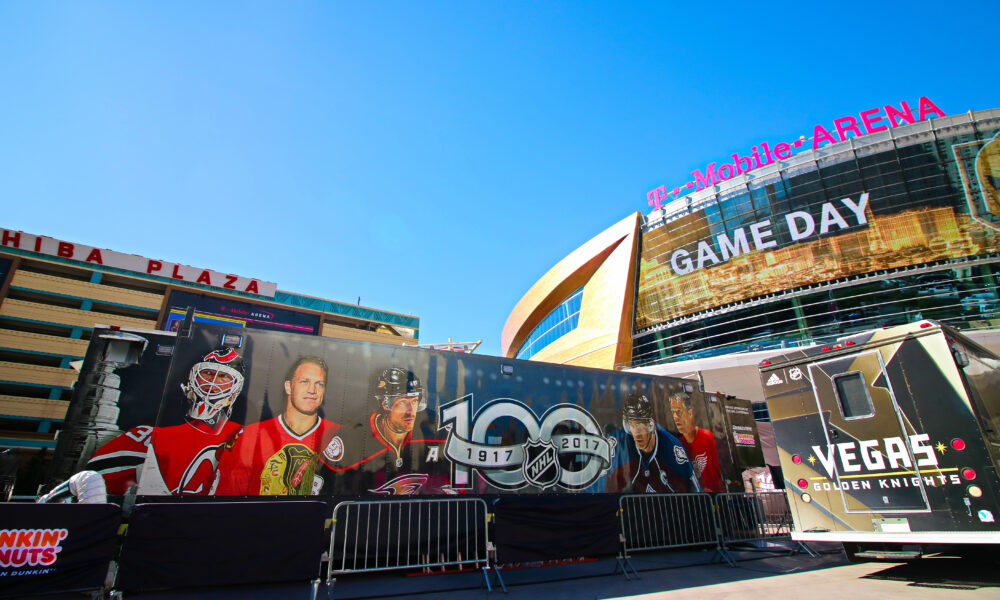Las Vegas tourism is projected to rebound in 2026 by one million visitors after a slowdown this year. In addition, a panel of experts told the city’s business leaders that sports will continue to help drive visitation to the city, along with resorts lowering prices and creating more value.
The Center for Business and Economic Research at the University of Nevada Las Vegas projects Las Vegas will host 40.1 million visitors in 2026, after falling 6% or 2.5 million in 2025 to a projected 39.1 million. In 2024, the 41.6 million visitors were still below the 42 million-plus who visited Las Vegas in the six years prior to the pandemic. Some 40 million-plus visitors are expected for 2027.
Because of the slowdown in visitation, CBER said occupancy will decrease by 3% in 2025, will be essentially flat in 2026, then falling again in 2027.
That outlook is less optimistic than the view held by the gaming industry. Executives have said they expect a strong 2026 after the fourth quarter of 2025 shows a rebound. Group bookings from conventions and meetings are helping drive the increase.
When it comes to gaming revenue, the report predicts that Las Vegas will end the year down 1.7.% That’s counter to the slight gaming-revenue gains recorded on the Strip through the first three quarters. The report suggests a 3% decline in 2026.
“Absent a new wave of a coronavirus variant, a major financial crisis leading to a significant recession, assuming the war in Ukraine will not widen in scale, and the financial system remains stable, the southern Nevada economy and local tourism sector will experience a mild contraction in much economic activity in the rest of 2025 and in 2026 and 2027,” the report said. “Last year, visitor volume, gross gaming revenue, hotel occupancy, and employment followed similar patterns of rebound from the pandemic recession in 2022 and slowing in that growth in 2023 as well as further reductions in growth, and even negative growth, in 2025, 2026, and 2027. Of these three variables, only visitor volume shows year over year growth and only in 2026, All other forecast changes are negative
over the forecast horizon.”
The report said visitor volume, gaming revenue, employment, and the unemployment rate respond to the business cycle and UNLV anticipates slower national economic activity as the Fed navigates toward the soft landing.
“Since the national economy plays an outsized role in Nevada’s and southern Nevada’s economic outlook, CBER’s current forecast shows a slowing, but predictable, path for the economy,” the report said.
Sports will be part of what continues to drive visitation to Las Vegas, according to Angeline Close Scheinbaum, a UNLV graduate and currently a professor of sports marketing at Clemson. She spoke at a CBER breakfast meeting Thursday at the Durango Casino & Resort. She highlighted the arrival of the Vegas Golden Knights of the NHL, Las Vegas Raiders of the NFL, Las Vegas Aces of the WNBA, and the forthcoming arrival of the A’s from California and construction of a $2 billion baseball stadium underway on the Strip. Formula One returns to Las Vegas next weekend. There is an expectation Las Vegas will attract an NBA team.
“Sports is bolstering the economy in many ways,” Scheinbaum said. “There’s a resilience of the marketplace and sports is behind a lot of that.”
Anjala Krishen, dean at the Lee Business School at UNLV who moderated a discussion with Scheinbaum, said Las Vegas is no longer a “one-trick pony” and no longer relies on gambling to attract visitors. Sports has helped Las Vegas in its new focus on entertainment and other areas of engagement.
“One of the aspects of being resilient is diversifying your portfolio,” Scheinbaum said. “We also have sports marketing as one of those hammers that can help diversify the economy. Vegas has had some hard times, and I think sports is going to be the answer. These mega events and the parallel industries that they bring would have been out of our league when I was here.”
CBER Director Andrew Woods said Las Vegas is tied to how the American consumer is doing and that’s why the visitation is down. Las Vegas is an indicator of the national economy based on consumer spending and the unemployment rates. He added, however, that Las Vegas is stabilizing after the slump over the summer.
“(Resorts) are adjusting,” Woods said. “They realize charging $50 for parking and $50 for martinis wasn’t always the best idea and that they need to offer value.”
Woods said while visitor travel is stabilizing, convention attendance is expected to be strong going forward with F1 and the National Finals Rodeo attracting crowds through the end of the year.
“Hovering around the 40 million visitor number next year is stable,” Woods said. “We would like to see growth. I know the (Las Vegas Convention and Visitors Authority) is working on it, along with our partners on the Strip. Given where the American consumer is, we need to figure out what that value proposition is.”
Woods pointed out that American visitors are still going to Florida, Hawaii, and Disneyland in southern California, so they’re willing to spend money.
“But they need that confidence when they come to Vegas they will get that value promised to them,” Woods said.
Gus Faucher, senior vice president and chief economist of The PNC Financial, said Las Vegas is the definition of discretionary consumer spending.
“Nobody needs to come to Las Vegas. People enjoy coming to Las Vegas, but the potential is out there, with weaker consumer confidence and concerns about tariffs and inflation,” Faucher said. “Growth in Las Vegas is likely to be weaker than national growth in the near term until consumers are more confident the economy is stabilizing.”
Faucher cited concerns that the U.S. is withdrawing from the global economy and trading partners and international visitors are upset about what’s happening in how the U.S. is treating their countries.
“That’s a real concern and can do long-range damage to the local economy if international tourists don’t want to come to the United States and Las Vegas because of the political climate.”
Woods said while they want travelers from Canada to come back to Las Vegas after declining sharply, there has least been an uptick in European travel to Las Vegas with the weaker dollar. “There’s some nuance to all of this, some concern about the reputation.”
Shani Coleman, director of community and economic development for Clark County who moderated a panel with Woods, said Las Vegas has been helped by a broader mix of people, not only spending money on gaming and sports, but restaurants and shopping.
“Gaming is still very important to our economy and our Strip operators, but it’s not where the growth is,” Woods said. “But it’s stable. Where you’ve seen the business model shift is more in the entertainment options and high-end food, dining, and sports. That’s why it’s important for our economy. Adding these extra things gives people a reason to come back.”



